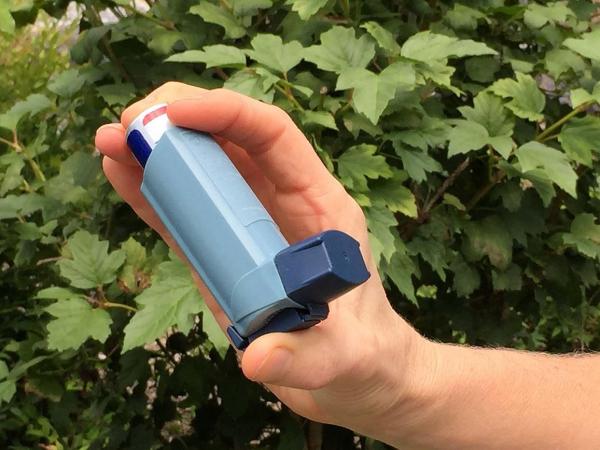A Hiatus From Food Could Benefit Asthma Patients

A small IRP pilot study found evidence that a 24-hour fast could inhibit a cellular pathway that contributes to asthma symptoms.
Between fast-food outlets, vending machines, and food trucks — not to mention good old-fashioned home cooking — many people face no shortage of opportunities to eat. But as satisfying as a crisp potato chip or a moist pork chop may be, people with asthma and many other conditions may prefer to resist tasty temptations if it means alleviating some of their symptoms. In a small pilot study, IRP researchers found evidence that abstaining from food for 24 hours could inhibit some of the cellular processes that cause asthmatics’ breathing problems.1
When the immune system perceives a threat, certain cells release chemicals that trigger a process called inflammation that helps combat harmful invaders like bacteria and viruses. A wide array of diseases, from asthma to arthritis to diabetes, occur when the body’s defenses get overzealous and marshal the troops in response to common, harmless triggers, or even for no reason at all.
Many studies suggest that one way to tamp down a jumpy immune system is by fasting for a short period of time.2,3,4 IRP investigator Michael Sack, M.D., Ph.D., is particularly interested in how dietary interventions affect a bodily defense system called the NLRP3 inflammasome. When working optimally, this system responds to threats by causing certain cells to release inflammation-inducing chemicals called cytokines. However, in patients with asthma and other diseases related to excessive inflammation, the inflammasome releases cytokines when they are not needed.
“If you looked at asthma research literature five years ago, scientists were really only talking about immune system cells that aren’t part of the inflammasome,” says Dr. Sack. “It’s only been recently recognized that the inflammasome is a component of the inflammatory processes at play in asthma.”
After a morning meal, the 18 participants in Dr. Sack’s study fasted for 24 hours, during which they consumed only water. Afterwards, they gave blood samples, underwent a test to measure their lung function, and then were given a meal to end their fast. Two and a half hours later, the blood draw and lung test were repeated.
The researchers isolated a component of the participants’ blood, called serum, that contains a variety of nutrients, various chemicals produced by the body’s organs, and immune cells called peripheral blood mononuclear cells (PBMCs), some of which are key players in the NLRP3 inflammasome. Compared to PBMCs from blood drawn after the post-fast meal, the cells from blood taken when the participants had not eaten for 24 hours released lower amounts of inflammatory cytokines when stimulated and showed less activity in NLRP3-related genes. However, this was only the case in the patients who had never taken steroid-based asthma medications, suggesting that steroids somehow circumvent the effects of fasting on the NLRP3 inflammasome.
Next, the investigators combined serum from patients who were not on steroid medications with human lung cells and a common allergen called house dust mites. Again, the PBMCs from post-fast blood samples released fewer cytokines than the PBMCs from post-meal blood samples, and the epithelial cells showed the same behavior. Another experiment that focused specifically on immune system cells called type-2 helper T cells found that they were less active after fasting compared to after the post-fast meal. They also had lower levels of a molecule called GATA3 that spurs their response to threats.
“There definitely seems to be some component of serum that plays a role in curbing these inflammatory reactions in response to fasting or exacerbating inflammation after eating,” Dr. Sack says.
Despite these promising results, the patients’ lung function was no better immediately after the fast compared to after the post-fast meal. Dr. Sack suspects a single 24-hour fast was not long enough for the cellular changes to substantially reverse the long-standing effects of asthma in the lungs. Still, the study’s results suggest that inhibiting the NLRP3 inflammasome, whether through fasting or another intervention, could potentially alleviate asthma symptoms.
“People are developing medications that can mimic the ways that fasting affects the body,” Dr. Sack says. “These treatments trigger the same cellular programs without the fasting, so we’re eager to learn more about how those agents affect the immune system.”
Subscribe to our weekly newsletter to stay up-to-date on the latest breakthroughs in the NIH Intramural Research Program.
References:
[1] A pilot study to investigate the immune-modulatory effects of fasting in steroid-naïve mild asthmatics. Han K, Nguyen A, Traba J, Yao X, Kaler M, Huffstutler RD, Levine SJ, Sack MN. J Immunol. 2018 Jul 18. pii: ji1800585. doi: 10.4049/jimmunol.1800585.
[2] Alternate Day Calorie Restriction Improves Clinical Findings and Reduces Markers of Oxidative Stress and Inflammation in Overweight Adults with Moderate Asthma. Johnson JB, Summer W, Cutler RG, Martin B, Hyun DH, Dixit VD, Pearson M, Nassar M, Telljohann R, Maudsley S, Carlson O, John S, Laub DR, Mattson MP. Free Radic. Biol. Med. 2007 Mar 1;42(5):665-674. doi: 10.1016/j.freeradbiomed.2006.12.005.
[3] A Diet Mimicking Fasting Promotes Regeneration and Reduces Autoimmunity and Multiple Sclerosis Symptoms. Choi IY, Piccio L, Childress P, Bollman B, Ghosh A, Brandhorst S, Suarez J, Michalsen A, Cross AH, Morgan TE, Wei M, Paul F, Bock M, Longo VD. Cell Rep. 2016 Jun 7;15(10):2136-2146. doi: 10.1016/j.celrep.2016.05.009.
[4] Fasting and refeeding differentially regulate NLRP3 inflammasome activation in human subjects. Traba J, Kwarteng-Siaw M, Okoli TC, Li J, Huffstutler RD, Bray A, Waclawiw MA, Han K, Pelletier M, Sauve AA, Siegel RM, Sack MN. J Clin Invest. 2015 Nov 3;125(12):4592-600. doi: 10.1172/JCI83260.
Related Blog Posts
This page was last updated on Monday, January 29, 2024
